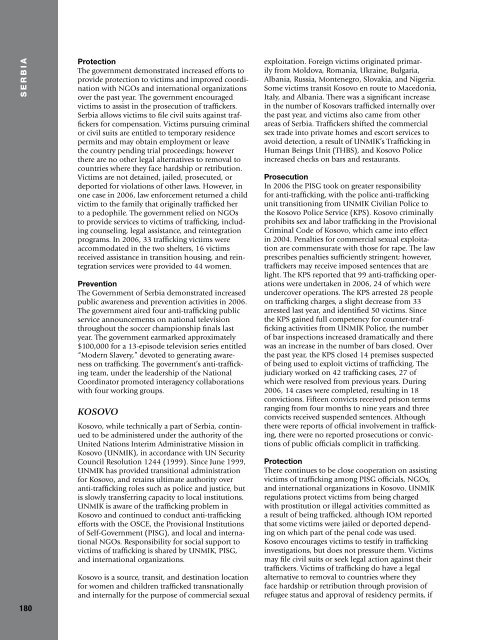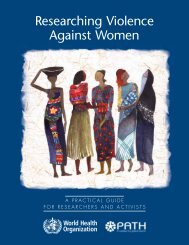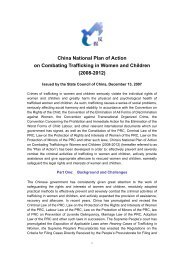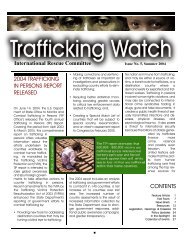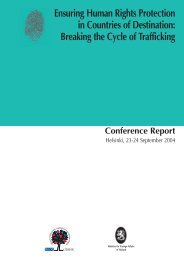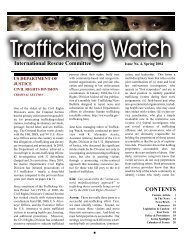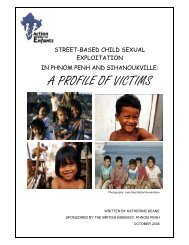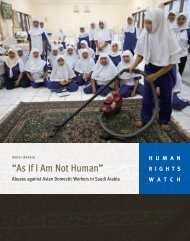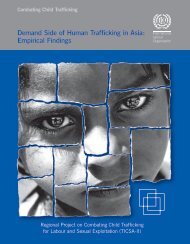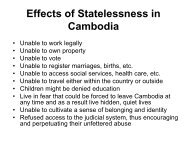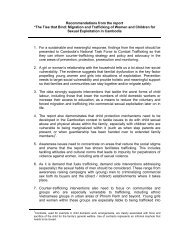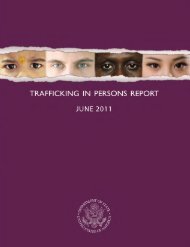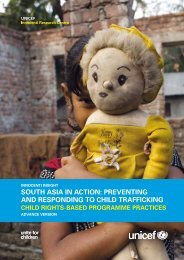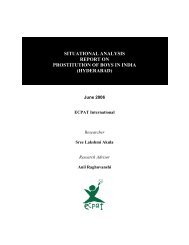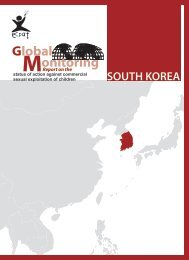2007 Trafficking in Persons Report - Center for Women Policy Studies
2007 Trafficking in Persons Report - Center for Women Policy Studies
2007 Trafficking in Persons Report - Center for Women Policy Studies
You also want an ePaper? Increase the reach of your titles
YUMPU automatically turns print PDFs into web optimized ePapers that Google loves.
S E R B I A<br />
180<br />
Protection<br />
The government demonstrated <strong>in</strong>creased ef<strong>for</strong>ts to<br />
provide protection to victims and improved coord<strong>in</strong>ation<br />
with NGOs and <strong>in</strong>ternational organizations<br />
over the past year. The government encouraged<br />
victims to assist <strong>in</strong> the prosecution of traffickers.<br />
Serbia allows victims to file civil suits aga<strong>in</strong>st traffickers<br />
<strong>for</strong> compensation. Victims pursu<strong>in</strong>g crim<strong>in</strong>al<br />
or civil suits are entitled to temporary residence<br />
permits and may obta<strong>in</strong> employment or leave<br />
the country pend<strong>in</strong>g trial proceed<strong>in</strong>gs; however<br />
there are no other legal alternatives to removal to<br />
countries where they face hardship or retribution.<br />
Victims are not deta<strong>in</strong>ed, jailed, prosecuted, or<br />
deported <strong>for</strong> violations of other laws. However, <strong>in</strong><br />
one case <strong>in</strong> 2006, law en<strong>for</strong>cement returned a child<br />
victim to the family that orig<strong>in</strong>ally trafficked her<br />
to a pedophile. The government relied on NGOs<br />
to provide services to victims of traffick<strong>in</strong>g, <strong>in</strong>clud<strong>in</strong>g<br />
counsel<strong>in</strong>g, legal assistance, and re<strong>in</strong>tegration<br />
programs. In 2006, 33 traffick<strong>in</strong>g victims were<br />
accommodated <strong>in</strong> the two shelters, 16 victims<br />
received assistance <strong>in</strong> transition hous<strong>in</strong>g, and re<strong>in</strong>tegration<br />
services were provided to 44 women.<br />
Prevention<br />
The Government of Serbia demonstrated <strong>in</strong>creased<br />
public awareness and prevention activities <strong>in</strong> 2006.<br />
The government aired four anti-traffick<strong>in</strong>g public<br />
service announcements on national television<br />
throughout the soccer championship f<strong>in</strong>als last<br />
year. The government earmarked approximately<br />
$100,000 <strong>for</strong> a 13-episode television series entitled<br />
“Modern Slavery,” devoted to generat<strong>in</strong>g awareness<br />
on traffick<strong>in</strong>g. The government’s anti-traffick<strong>in</strong>g<br />
team, under the leadership of the National<br />
Coord<strong>in</strong>ator promoted <strong>in</strong>teragency collaborations<br />
with four work<strong>in</strong>g groups.<br />
KOSOVO<br />
Kosovo, while technically a part of Serbia, cont<strong>in</strong>ued<br />
to be adm<strong>in</strong>istered under the authority of the<br />
United Nations Interim Adm<strong>in</strong>istrative Mission <strong>in</strong><br />
Kosovo (UNMIK), <strong>in</strong> accordance with UN Security<br />
Council Resolution 1244 (1999). S<strong>in</strong>ce June 1999,<br />
UNMIK has provided transitional adm<strong>in</strong>istration<br />
<strong>for</strong> Kosovo, and reta<strong>in</strong>s ultimate authority over<br />
anti-traffick<strong>in</strong>g roles such as police and justice, but<br />
is slowly transferr<strong>in</strong>g capacity to local <strong>in</strong>stitutions.<br />
UNMIK is aware of the traffick<strong>in</strong>g problem <strong>in</strong><br />
Kosovo and cont<strong>in</strong>ued to conduct anti-traffick<strong>in</strong>g<br />
ef<strong>for</strong>ts with the OSCE, the Provisional Institutions<br />
of Self-Government (PISG), and local and <strong>in</strong>ternational<br />
NGOs. Responsibility <strong>for</strong> social support to<br />
victims of traffick<strong>in</strong>g is shared by UNMIK, PISG,<br />
and <strong>in</strong>ternational organizations.<br />
Kosovo is a source, transit, and dest<strong>in</strong>ation location<br />
<strong>for</strong> women and children trafficked transnationally<br />
and <strong>in</strong>ternally <strong>for</strong> the purpose of commercial sexual<br />
exploitation. Foreign victims orig<strong>in</strong>ated primarily<br />
from Moldova, Romania, Ukra<strong>in</strong>e, Bulgaria,<br />
Albania, Russia, Montenegro, Slovakia, and Nigeria.<br />
Some victims transit Kosovo en route to Macedonia,<br />
Italy, and Albania. There was a significant <strong>in</strong>crease<br />
<strong>in</strong> the number of Kosovars trafficked <strong>in</strong>ternally over<br />
the past year, and victims also came from other<br />
areas of Serbia. Traffickers shifted the commercial<br />
sex trade <strong>in</strong>to private homes and escort services to<br />
avoid detection, a result of UNMIK’s <strong>Traffick<strong>in</strong>g</strong> <strong>in</strong><br />
Human Be<strong>in</strong>gs Unit (THBS), and Kosovo Police<br />
<strong>in</strong>creased checks on bars and restaurants.<br />
Prosecution<br />
In 2006 the PISG took on greater responsibility<br />
<strong>for</strong> anti-traffick<strong>in</strong>g, with the police anti-traffick<strong>in</strong>g<br />
unit transition<strong>in</strong>g from UNMIK Civilian Police to<br />
the Kosovo Police Service (KPS). Kosovo crim<strong>in</strong>ally<br />
prohibits sex and labor traffick<strong>in</strong>g <strong>in</strong> the Provisional<br />
Crim<strong>in</strong>al Code of Kosovo, which came <strong>in</strong>to effect<br />
<strong>in</strong> 2004. Penalties <strong>for</strong> commercial sexual exploitation<br />
are commensurate with those <strong>for</strong> rape. The law<br />
prescribes penalties sufficiently str<strong>in</strong>gent; however,<br />
traffickers may receive imposed sentences that are<br />
light. The KPS reported that 99 anti-traffick<strong>in</strong>g operations<br />
were undertaken <strong>in</strong> 2006, 24 of which were<br />
undercover operations. The KPS arrested 28 people<br />
on traffick<strong>in</strong>g charges, a slight decrease from 33<br />
arrested last year, and identified 50 victims. S<strong>in</strong>ce<br />
the KPS ga<strong>in</strong>ed full competency <strong>for</strong> counter-traffick<strong>in</strong>g<br />
activities from UNMIK Police, the number<br />
of bar <strong>in</strong>spections <strong>in</strong>creased dramatically and there<br />
was an <strong>in</strong>crease <strong>in</strong> the number of bars closed. Over<br />
the past year, the KPS closed 14 premises suspected<br />
of be<strong>in</strong>g used to exploit victims of traffick<strong>in</strong>g. The<br />
judiciary worked on 42 traffick<strong>in</strong>g cases, 27 of<br />
which were resolved from previous years. Dur<strong>in</strong>g<br />
2006, 14 cases were completed, result<strong>in</strong>g <strong>in</strong> 18<br />
convictions. Fifteen convicts received prison terms<br />
rang<strong>in</strong>g from four months to n<strong>in</strong>e years and three<br />
convicts received suspended sentences. Although<br />
there were reports of official <strong>in</strong>volvement <strong>in</strong> traffick<strong>in</strong>g,<br />
there were no reported prosecutions or convictions<br />
of public officials complicit <strong>in</strong> traffick<strong>in</strong>g.<br />
Protection<br />
There cont<strong>in</strong>ues to be close cooperation on assist<strong>in</strong>g<br />
victims of traffick<strong>in</strong>g among PISG officials, NGOs,<br />
and <strong>in</strong>ternational organizations <strong>in</strong> Kosovo. UNMIK<br />
regulations protect victims from be<strong>in</strong>g charged<br />
with prostitution or illegal activities committed as<br />
a result of be<strong>in</strong>g trafficked, although IOM reported<br />
that some victims were jailed or deported depend<strong>in</strong>g<br />
on which part of the penal code was used.<br />
Kosovo encourages victims to testify <strong>in</strong> traffick<strong>in</strong>g<br />
<strong>in</strong>vestigations, but does not pressure them. Victims<br />
may file civil suits or seek legal action aga<strong>in</strong>st their<br />
traffickers. Victims of traffick<strong>in</strong>g do have a legal<br />
alternative to removal to countries where they<br />
face hardship or retribution through provision of<br />
refugee status and approval of residency permits, if


